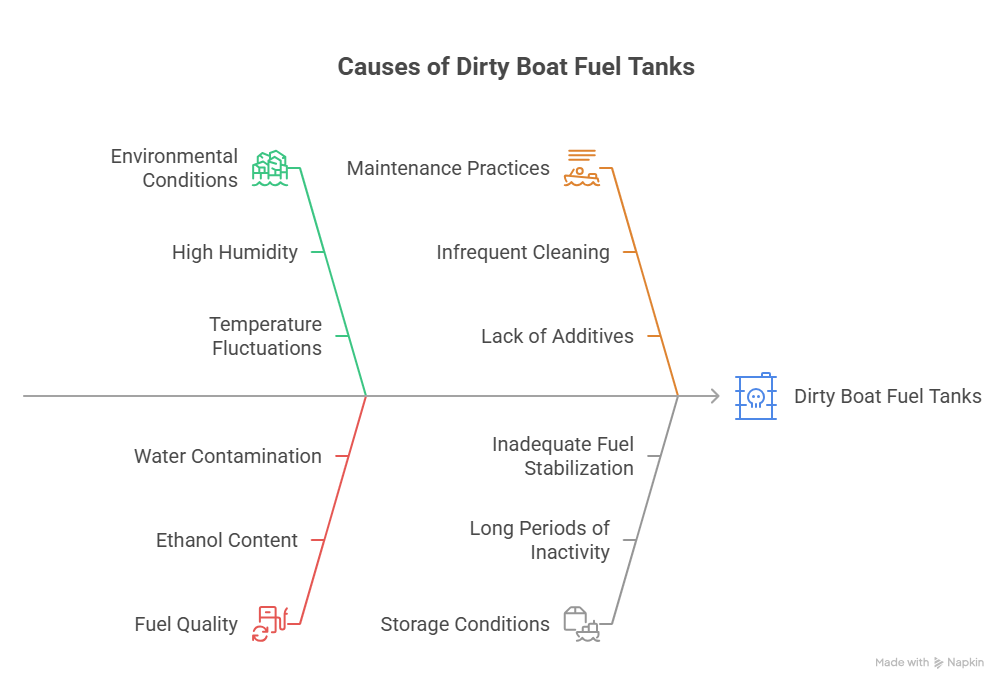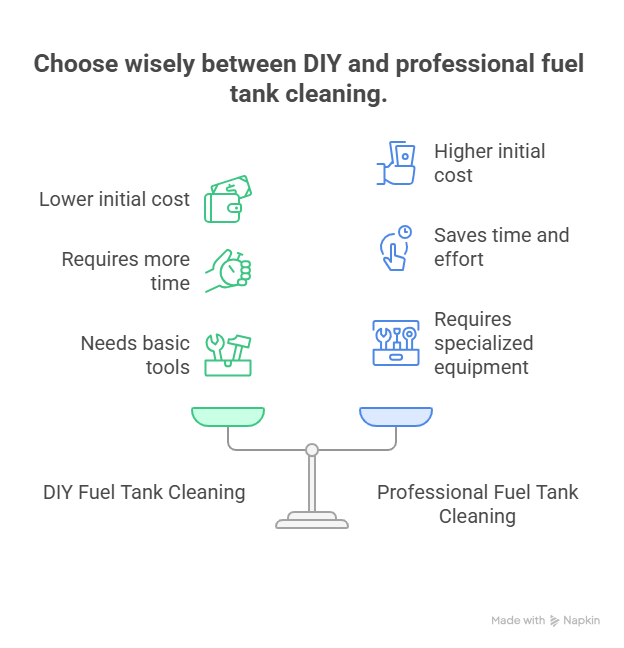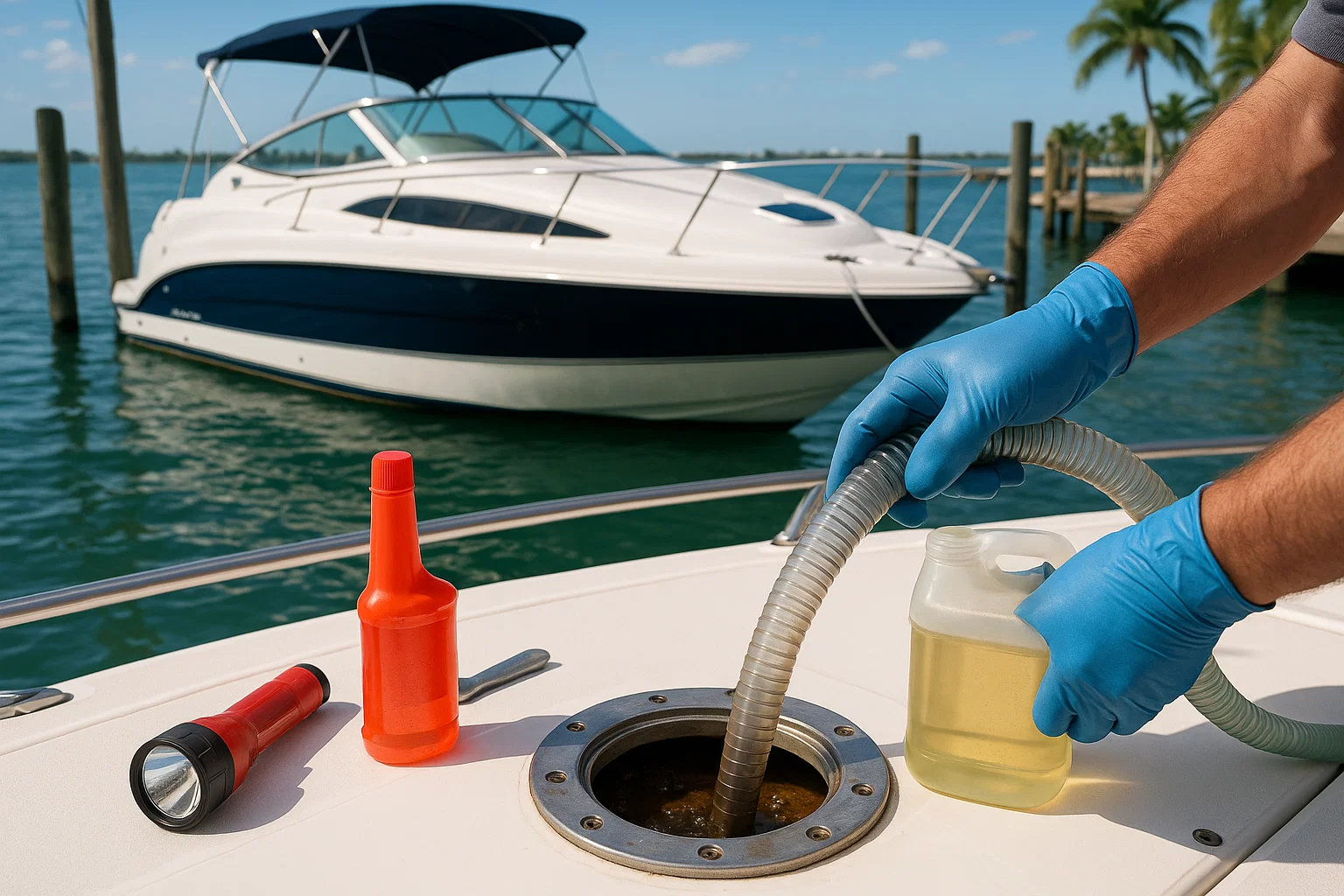Boat Fuel Tank Cleaner: My 15-Year Guide to Keeping Engines Running
I’ve been wrenching on boats in South Florida for 15 years, and nothing kills a day on the water faster than a sputtering engine. Last July, a guy named Carlos at Dinner Key Marina brought me his 2021 Bayliner 285—engine coughing, barely hitting 10 knots. The culprit? A gunked-up fuel tank full of water and sludge. I used a boat fuel tank cleaner—Star Tron, to be exact—and a fuel pressure tester to confirm the fix, saving him a $2,500 overhaul. Dirty fuel tanks are the silent enemy of marine engines, and I’ve seen too many boaters stranded off Key Biscayne because they skipped basic maintenance. This guide shares my hard-won lessons on using boat fuel tank cleaners to keep your engine reliable, with tips to avoid costly repairs.
Table of Contents
Why Does My Boat’s Fuel Tank Get Dirty?
Fuel tanks in Miami’s humid marinas are a magnet for trouble. Water sneaks in through condensation or a cracked fuel cap O-ring, mixing with ethanol fuel to create a corrosive mess. Sludge, gum, and even “diesel algae” (really bacteria) build up, clogging filters and starving your engine. I once saw a Sea Ray 230’s tank so slimy it looked like a science experiment—cost the owner $1,800 to fix. Regular use of a boat fuel tank cleaner stops this before it starts.
What’s the Best Boat Fuel Tank Cleaner for Deep Cleaning?
For a neglected tank, enzymatic cleaners are my go-to. They digest organic gunk like sludge and microbial growth without harsh solvents. Last summer, I used Star Tron Fuel Tank Cleaner on a client’s Grady-White 208 at Coconut Grove. The tank was a mess—three inches of sludge. After a 24-hour soak and a filter swap, the engine purred again, saving a $3,000 fuel system job.
How Do Detergent Additives Help with Routine Maintenance?
Detergent additives like Techron Protection Plus Marine are my secret weapon for keeping tanks clean. They scrub injectors and valves, preventing carbon buildup. I add a dose to my Boston Whaler’s tank every fill-up—costs about $10 a tank. A buddy at Bahia Mar skipped this, and his Yamaha 200’s injectors clogged, costing $600 to replace. Use these with every fill-up after a deep clean.
Why Use Fuel Stabilizers for Boat Storage?
Stabilizers aren’t cleaners, but they’re critical for preventing gunk during storage. Sta-Bil Marine Storage Stabilizer stops fuel from breaking down and manages water from condensation. I learned this the hard way in 2012 when my old Mercury 150 seized after a winter layup—$2,000 mistake. Add a stabilizer before storing your boat, especially in Florida’s heat.
How Do I Clean My Boat’s Fuel Tank Step-by-Step?
Cleaning a fuel tank isn’t rocket science, but it takes patience. Here’s my process, refined over 200+ jobs:
- Prep Safely: Disconnect the battery and ventilate the area. I once saw a spark ignite fumes at Stiltsville—scary stuff.
- Drain the Tank: Siphon old fuel into an approved container. Use a flashlight to check for sludge.
- Mechanical Purge: Wipe out gunk with lint-free cloths or use a suction hose for tight tanks.
- Chemical Clean: Add a boat fuel tank cleaner like Star Tron, follow the dosage, and let it sit for 24 hours. Rock the boat to agitate.
- Rinse and Dry: Pump out the cleaner and air-dry the tank.
- Replace Filters: Swap the primary fuel filter and fuel/water separator—non-negotiable. I use Racor filters for reliability.
- Refill and Treat: Fill with fresh fuel from a high-traffic marina and add Techron Marine.
This got a client’s Sea Ray 350 back on the water last June, no issues since.

What Are the Signs My Fuel Tank Needs Cleaning?
Look for rough idling, sluggish acceleration, or engine stalling—classic fuel starvation signs. I check my fuel/water separator monthly; cloudy fuel or gunk means trouble. Last month, a client at Key Biscayne ignored a clogged filter, and his Mercury 250 went into limp mode—$300 fix. A boat fuel tank cleaner can prevent this if you act early.
How Often Should I Use a Boat Fuel Tank Cleaner?
For a deep clean, once every 2–3 years unless you see issues sooner. I do it annually on my Whaler because Miami’s humidity is brutal. For routine maintenance, add a detergent additive like Techron every fill-up. A guy at Fort Lauderdale’s Bahia Mar skipped this and paid $1,200 for injector repairs last spring.
Can I Clean My Fuel Tank Myself or Call a Pro?
DIY is doable for smaller tanks with good access. I showed a buddy at Dinner Key how to clean his Sea Ray 230’s tank in an hour—cost him $50 in supplies. But if you see corrosion or persistent gunk, call a pro for fuel polishing. It costs $300–$500 but beats a $5,000 engine rebuild. I use Sofia’s Marine Repair for tough jobs.
How Do I Prevent Fuel Tank Contamination?
Prevention’s easier than cleaning. Keep your tank full to cut condensation—learned this after a $500 repair in 2014. Check your fuel cap’s O-ring yearly; a $2 part stops rainwater leaks. Buy fuel from busy marinas like Coconut Grove’s—fresher fuel means less gunk. Add a stabilizer like Sta-Bil for storage.
What’s the Cost of Ignoring a Dirty Fuel Tank?
Skip cleaning, and you’re rolling the dice. Clogged filters cost $50–$100 to replace, but injector damage runs $600–$2,000. A full fuel system overhaul? Up to $8,000. I saw a guy off Stiltsville pay $1,500 for a tow after his engine stalled from bad fuel. A $20 boat fuel tank cleaner could’ve saved him.

Comparison Table: My Go-To Boat Fuel Tank Cleaners
I put this table together from jobs I’ve done in South Florida:
| Product | Use Case | Cost | Availability |
|---|---|---|---|
| Star Tron Fuel Tank Cleaner | Deep cleaning neglected tanks | $20–$30 | Marine stores, online |
| Techron Protection Plus Marine | Routine maintenance, injector cleaning | $10–$15/tank | Most marinas |
| Sta-Bil Marine Storage | Preventing gunk during storage | $8–$12 | Auto/marine stores |
FAQ: Boat Fuel Tank Cleaner Questions
What’s the best boat fuel tank cleaner for ethanol issues?
Star Tron’s enzymatic formula handles ethanol’s water-absorbing mess. I used it on a client’s Bayliner last July—cleared phase separation in 24 hours. Costs $20 and saves thousands in repairs.
How do I know if my fuel tank needs a deep clean?
Check your fuel/water separator for cloudy fuel or sludge. Rough idling or stalling screams contamination. I caught this on a Sea Ray at Coconut Grove last month—$200 fix with Star Tron.
Can a boat fuel tank cleaner fix microbial growth?
Yes, enzymatic cleaners like Star Tron digest “diesel algae.” I used it on a Grady-White’s tank in 2023—slime gone in a day. Follow with a filter swap to protect your engine.
How often should I add a fuel additive?
Every fill-up. I use Techron Marine to keep my Whaler’s injectors clean—$10 a tank. A client skipped this and paid $600 for clogged injectors last spring.
What’s the difference between a cleaner and a stabilizer?
Cleaners like Star Tron dissolve existing gunk; stabilizers like Sta-Bil prevent it. I add Sta-Bil before winter storage—saved my Mercury 150 in 2022.
Why replace filters after cleaning the tank?
Old filters trap dislodged debris, starving your engine. I swap Racor filters after every deep clean—$50 well spent. Skipping this cost a guy $1,200 in injector damage.
When should I call a professional for fuel tank cleaning?
If you see corrosion or persistent gunk, get a pro for fuel polishing. I sent a client to Sofia’s Marine Repair last June—$400 job saved a $5,000 rebuild.
How does a full tank prevent contamination?
Less air means less condensation. I keep my tank full during storage—learned after a $500 repair in 2014. Check your O-ring too; a $2 fix stops leaks.
What’s the cost of professional fuel polishing?
Around $300–$500, depending on tank size. It’s cheaper than a $2,000 injector job. I saw a pro save a Sea Ray’s engine at Bahia Mar last summer.
Why buy fuel from high-traffic marinas?
Fresh fuel has less time to degrade. I stick to Coconut Grove’s marina—saved me from bad gas in 2023. Stale fuel clogs filters fast.
Conclusion
A clean fuel tank isn’t just about avoiding breakdowns—it’s about keeping your boat reliable and your days on the water stress-free. I’ve seen too many boaters off Stiltsville cursing their engines because they skipped a $20 boat fuel tank cleaner. Use enzymatic cleaners like Star Tron for deep jobs, Techron for every fill-up, and Sta-Bil for storage. Replace filters after cleaning—non-negotiable. Keep your tank full and check that O-ring. These habits saved my Boston Whaler from a $2,000 repair last year. Inspect your fuel/water separator this weekend, start a fuel additive routine, and your engine will thank you with flawless performance all season.
Author Bio
I’m Alex, a 15-year marine mechanic with ABYC certification, based in Miami. I’ve fixed 200+ boat engines, from Bayliners to Yamahas, across South Florida’s marinas.


Leave a Reply